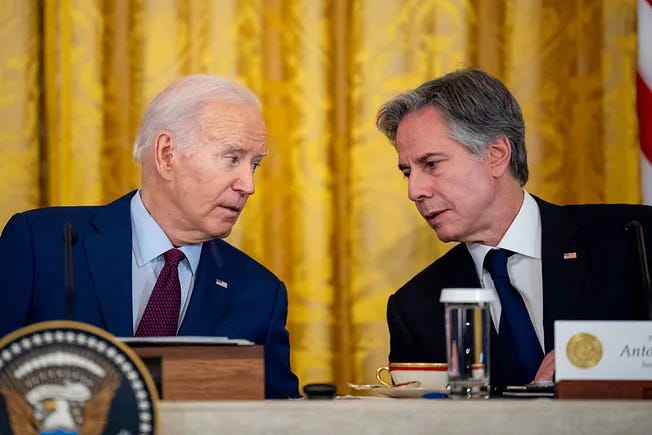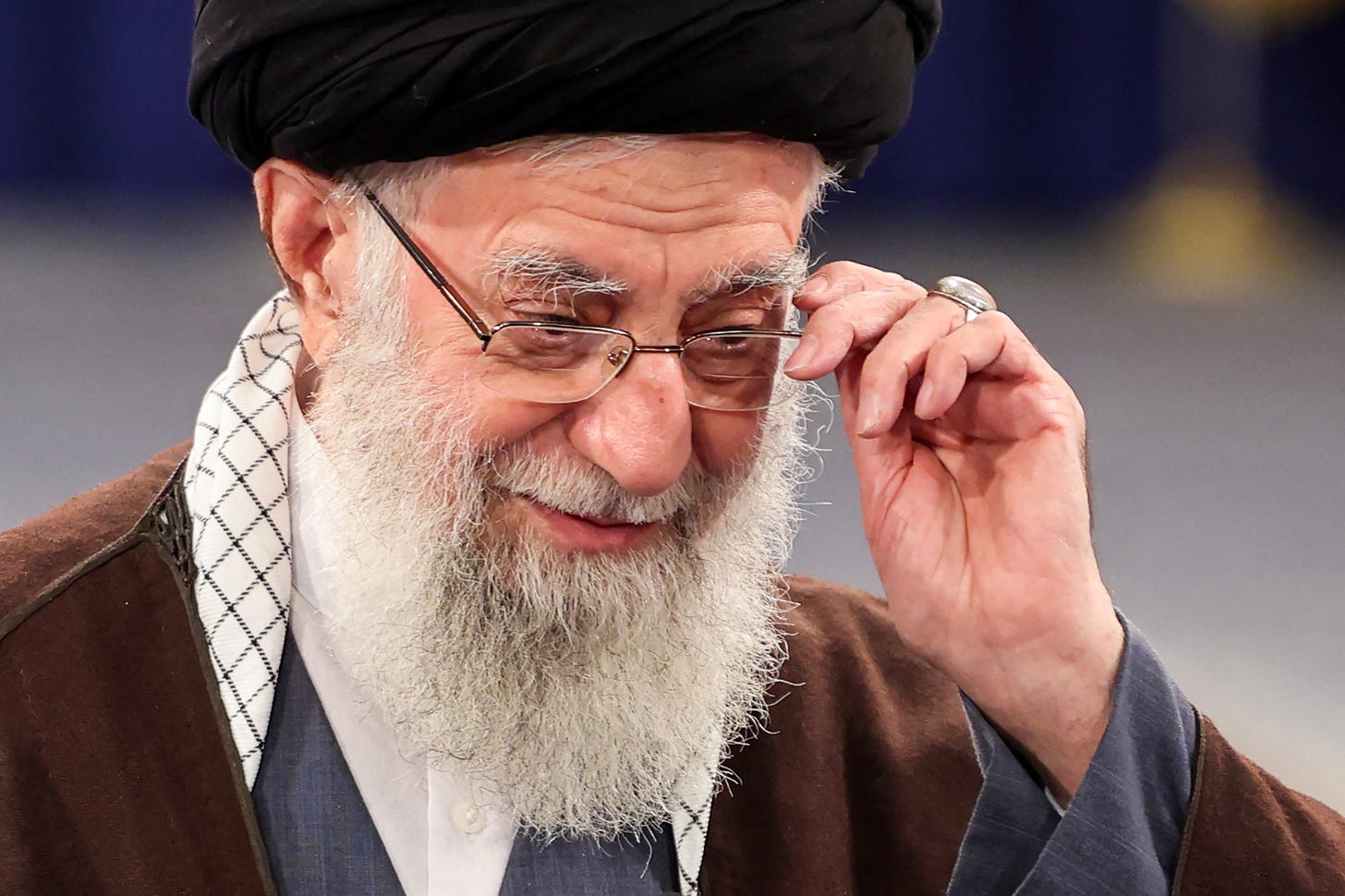How Did the War Begin? With Iran’s Appeasers in Washington
Historians will look back and wonder how the U.S. not only allowed Iran to repeatedly assault its citizens, soldiers, and allies—but rewarded it for doing so.
This article originally appeared in The Free Press.

JERUSALEM — Historians writing years from now about the Middle East conflagration of 2024 will undoubtedly ask, “When did it all begin?” Some will point to the Bush administration which, demoralized by its inconclusive wars in Afghanistan and Iraq, rejected Israel’s entreaties to take out Iran’s then-inchoate nuclear program in 2008.
Others might cite Israel’s willingness to play by the mullahs’ rules, retaliating against their Hezbollah and Hamas proxies rather than against Iran itself, enabling it to emerge from each round of fighting utterly unscathed.
But the bulk of the blame, fair historians will likely agree, will have to fall on the policies of those in Washington who sought to appease Iran at almost any price and ignore its serial aggressions.
Those policies began in the week after President Barack Obama’s inauguration in January 2009. In one of the forty-fourth president’s first acts of foreign diplomacy, Obama sent an offer of reconciliation to Iran’s Supreme Leader, Ayatollah Ali Khamenei. That June, in his historic Cairo speech, Obama became the first president to refer to Tehran’s regime as the Islamic Republic of Iran—legitimizing the oppressive theocracy—and stood aside while that republic’s thugs beat and shot hundreds of Iranian citizens protesting for their freedom.
Over the next four years, the White House ignored a relentless spate of Iranian aggressions—attacks against U.S. Navy vessels in the Persian Gulf; backing for al-Qaeda and other terrorist groups dedicated to America’s destruction; and barely disguised efforts to undermine pro-Western Middle Eastern governments.
At the same time, Iran supported Syrian dictator Bashar al-Assad’s mass slaughter—often with poison gas—of his own countrymen. Obama had declared Syria’s use of chemical weapons as “a red line” that would have “enormous consequences” on America’s involvement in the war. It didn’t.
In Washington, the administration overlooked an Iranian attempt to assassinate the Saudi and Israeli ambassadors (including me) and ended a federal investigation of a billion-dollar Hezbollah drug and arms trafficking ring in the United States. Most egregiously, Iran constructed secret underground nuclear facilities and developed an intercontinental ballistic missile delivery system that threatened the entire Middle East and much of Europe.
Why would any White House, even one devoted to rebuilding America’s relationship with the Islamic world, seek rapprochement with such a regime?
At the time, there were multiple reasons. First, there was the desire of the United States, tired of Middle Eastern wars and no longer dependent on Arab oil, to withdraw from the region and focus on the Far East. Next, there was the belief that the U.S. had traditionally relied on its Sunni and Israeli allies only to discover that Sunnis perpetrated 9/11 and Israelis defied American policy in the West Bank. The Iranians, stronger, modern, and open to the West—so many American policymakers concluded—offered a better alternative if only their leadership were assuaged. Lastly, and ultimately most decisively, was the Iranian nuclear program, a burgeoning strategic threat that the White House refused to interdict by military means.
The nuclear agreement reached in 2015 between the United States, the United Kingdom, France, China, Russia, Germany, and Iran—euphemistically called the Joint Comprehensive Plan of Action (JCPOA)—had three major objectives: to block Iran’s path to the bomb, ensure that Iran became what Obama called “a responsible regional power,” and, failing that, to kick the “nuclear can” down the road. The first two goals proved illusory.

Rather than block Iran’s path to the bomb, the agreement solidly paved it by allowing Iran to retain most of its nuclear infrastructure and to continue producing ever more advanced centrifuges capable of reducing Iran’s breakout time to mere weeks. The deal put no meaningful restrictions on Iran’s missile delivery systems or its clandestine weapons programs. And even then, the largely cosmetic limitations were set to expire in less than a decade. Well before that time, though, Iran harnessed the deal’s financial and strategic rewards to expand its sphere of influence across Iraq, Syria, and Lebanon. So much for the responsible regional power.
In 2018, President Trump withdrew from the JCPOA, reinstated punishing sanctions on Iran, and retaliated for Iranian attacks against Americans, indicating a different approach to the issue, but that policy proved short-lived. A centerpiece of Joe Biden’s 2019 presidential campaign was his pledge to restore America’s adherence to the JCPOA. No sooner had the Democrats regained the White House than the Iranians began to violate the agreement on a massive scale, gradually achieving military nuclear threshold capacity.
Of the original motivations for the deal—blocking Iran’s path to the bomb and transforming Iran into a peaceful nation—neither remained. All Biden was left with was the ability to kick the can down the road and to uphold Obama’s singular foreign policy achievement.
As the Iranian centrifuges spun, the Biden administration entered into intense negotiations to renew the JCPOA. The talks were headed by Robert Malley, who was evicted from the Obama campaign in 2008 for meeting with Hamas. Under Biden, Malley became America’s special envoy to Iran, but he was recently ousted for mishandling sensitive information. Though the initiative to reinstate the deal eventually failed, the U.S. still provided Iran with at least $10 billion in funds that had been frozen, and reportedly much more than that in quiet sanction relief.
Meanwhile, the Iranian provocations mounted. An ally of Russia, Iran provided thousands of offensive drones and long-range missiles used to kill America’s allies in Ukraine. Since the start of the war against Hamas, Iranian proxies have launched more than 170 attacks against U.S. military bases in Iraq, Syria, and Jordan, and all but blocked international shipping through the strategically crucial Bab al-Mandeb Strait.
Still, the U.S. refrained from retaliating against Iran directly, or even holding it publicly responsible. When, in January, three American soldiers were killed by a drone strike by an Iranian-backed militia, the U.S. struck back at the militia and not at the country—or even the factory—that produced the bomb.
Then, on Sunday, a historic first: Tehran directly attacked Israel from its territory with hundreds of drones and missiles.
Historians will survey this inexplicable record and wonder how the United States not only allowed Iran to repeatedly assault its citizens, soldiers, and allies but consistently rewarded it for doing so. They may well conclude that in a desperate effort to avoid getting dragged into a regional Middle Eastern war, the U.S. might well have precipitated one.
While America’s friends in the Middle East, especially Israel, have every reason to feel grateful for the vital assistance they received in intercepting Iran’s missile and drone onslaught, they might also ask what the U.S. can now do differently to deter Iran from further aggression. Press reports about President Biden’s refusal to support an Israeli counterattack against Iran indicate, sadly, that nothing substantial in the U.S. position has changed. He has reportedly urged Israeli Prime Minister Benjamin Netanyahu to see the coordinated response to the attack as a “win.”
The Iranians, though, will not see things that way. Tehran will see this weekend’s direct attack on Israel as a victory—their own—for their ability to continue threatening Israel and destabilizing the Middle East with impunity. If Israel follows Biden’s advice it will send one message to the ayatollahs: “You can launch another 350 missiles and drones at Israel or try to kill Israelis by other means. Either way, the United States won’t stop you.”
Israel, of course, must respond differently. Our target cannot simply be the Iranian proxies that surround our country and that have waged war on us since October 7, but, as the Saudis call it, “the head of the snake.”
The story of America can end only one of two ways: either it stands up boldly against Iran and joins Israel in deterring it, or Iran emerges from this conflict once again unpunished, undiminished, and ready to inflict yet more devastating damage.




"That June, in his historic Cairo speech, Obama "
Little mentioned in the US is that the American Embassy invited prominent suspected members of Egypt's Muslim Brotherhood to attend the speech. This was unheard of in Egypt and indicated the Egyptian government should tread carefully against them.
2 years later President Mubarak was overthrown, after 3 decades of supporting the US, paving the way for a Muslim Brotherhood government.
It seems Barack Obama, the greatest beneficiary of affirmative action, thought himself so clever he would bypass all US allies in the Middle East to form a new alliance with America's greatest enemy there, supplanting our allies.
Too clever by half. Best to frame that Harvard degree and take it with a grain of salt.
Not that this could have come as a surprise given Obama's long friendship with Palestinian extremist Rashid Khalidi and US terrorist Bill Ayers.
It's almost beyond imagination how horrifically awful American policy has been towards Iran during the Obama and now Biden administrations. It defies rationality. Israel has the misfortune to be beholden to a nation that is incapable of formulating and carrying rational strategic policy. Netanyahu has made grotesque errors but in fairness to him this is a horrible hand he was given in 2009. American policy under Obama and Biden has been designed perfectly to strengthen Iran and weaken the entire west, including Israel. The sickest part is that the numbskulls in Washington even now STILL DON'T SEE IT and are urging on more of the same. It would be as if after Germany invaded Poland, Chamberlain held another Munich conference insisting that the most important thing was not to escalate.